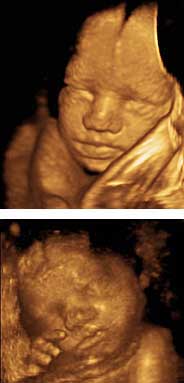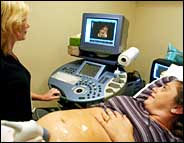 |
by Sam Lubell
It's a rite of passage for many expectant parents: baby's first ultrasound. The fuzzy images of the fetus, produced during an examination in an obstetrician's office, are prized by couples, passed around proudly among friends and relatives.
Now, trying to capitalize on this phenomenon, a number of companies are selling elective ultrasounds that have little to do with neonatal health. The services, often in small offices or shopping malls, amount to fetal photo studios and use newer 3-D ultrasound technology to produce more realistic images than conventional machines. Parents-to-be typically pay from about $80 for a short ultrasound session primarily to determine the fetus's sex to $300 for a half-hour session that is recorded on a videocassette or DVD and includes color photos. While medical professionals warn of potential health risks from unnecessary ultrasounds, those who offer the elective examinations say they are safe and fulfill a need. Women love it," said Matt Evans, a lawyer, who started his company, Baby Insight, a few years ago. "They get to see their baby and have an emotional experience with their baby." Mr. Evans said his technicians have performed more than 2,000 ultrasounds at the company's only location, in Potomac, Md. Baby Insight's highest-priced package, for $260, includes a video with background music, one 8-by-10, two 5-by-7, and 10 wallet-size color photos, four announcement cards and a chance for friends and family members to view the ultrasound images as they are produced on a large screen in the company's theater room. |
 Baby Insight Photogenic - Images from elective ultrasounds. The procedure is becoming more popular but has detractors. |
Mr. Evans said his employees tell customers that the ultrasounds are not meant to be a substitute for a doctor's exam.
Shirlesa Glaspie, 24, of Lanham, Md., underwent an ultrasound at Baby Insight late last month, when she was about 30 weeks pregnant (at its Web site, the company recommends the procedure be performed between 28 and 32 weeks for the "cutest" results). Ms. Glaspie said the images, while a bit "scary," have made the experience much more real.
"He's yawning, he sticks his tongue out, he smiles," she said. "It gives you a realization of what's going on when your stomach is moving around and bouncing around."
While doctors typically conduct ultrasounds at 20 weeks (when the fetus is large enough to show abnormalities), nonmedical ultrasounds are generally performed later, when the fetus is more developed and more photogenic.
Proponents of elective ultrasounds say they can be performed at the customer's convenience in a relaxed atmosphere, and more frequently employ 3-D machines, which are not as useful for observing internal organs for diagnostic purposes but are excellent at capturing realistic still or video images of the face and body.
"As the technology improves, more and more women will be wanting to see it," said Mr. Evans, who has plans to open 75 more centers nationwide by the end of 2005. "That's why we're trying to get in while the market is still undeveloped."
He has plenty of competition. Other companies offering the services include Peek-a-Boo Ultrasounds in California; Womb With a View in Pennsylvania, New Jersey and Texas; FetalFotos in Georgia; and Prenatal Peek, which has branches in North Carolina, South Carolina and California and is opening another in Hawaii, according to its Web site.
 Linda Spillers for The New York Times An early look Laurice Gaither undergoing an ultrasound examination by Kara Fleshner at Baby Insight in Potomac, Md. |
Many companies buy new or used medical equipment made by companies like General Electric, Siemens, Philips and Medison. Prices range from around $25,000 to more than $150,000. Mr. Evans said he bought his used GE Voluson 730 from a national distributor, for $75,000. He would not name the company, in part, he acknowledged, because he feared that the Food and Drug Administration, which regulates medical equipment, might crack down on distributors. Some doctors and federal regulators think ultrasounds performed outside the medical establishment may pose health risks. The American Institute of Ultrasound in Medicine, a professional group, and the Food and Drug Administration have strongly opposed elective ultrasounds, saying that unnecessary exposure to high-frequency sound waves could be unhealthy. |
part 1 | part 2